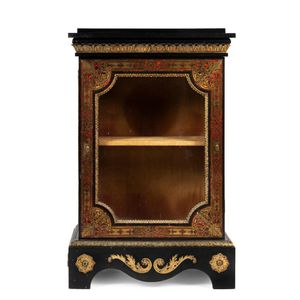Napoleon III Boulle Pier Cabinet with Gilt Bronze Mounts
A Napoleon III gilt bronze mounted Boulle pier cabinet, 19th century, with a single glazed door and decorated throughout with scrolling brass strap-work and classical mounts, 109 cm high, 69 cm wide, 34.5 cm deep
You must be a subscriber, and be logged in to view price and dealer details.
Subscribe Now to view actual auction price for this item
When you subscribe, you have the option of setting the currency in which to display prices to $Au, $US, $NZ or Stg.
This item has been sold, and the description, image and price are for reference purposes only.
- Boulle - Boulle work is the name given to tortoiseshell and metal inlay using brass and sometimes silver, found on furniture and smaller wooden objects. It originated in Italy but was developed by Frenchman Andre Charles Boulle (1642 - 1732) under Louis XIV.
Boulle was appointed Royal Cainet Maker to Louis XIV and designed furniture and clockcases for the monarch.
In preparation, the tortoiseshell and metal were cut together following a design, using a fine fret saw.
In the application of the Boulle, the carcase of piece of furniture was covered with the tortoiseshell which in turn was inlaid with the matched designs in metal, which in turn was elaborately engraved.
The use of Boulle work furniture continued mainly in France until the 19th century. - Mounts - Mounts are used to describe bronze, brass and ormolu adornments on furniture especially quality furniture in the rococo and classical revival style, and are also the cabinet makers' name for the metal fittings on furniture, such as hinges, locks and handles, and metal edges and guards which protect furniture from damage.
- Bronze - An alloy of copper and tin, traditionally in the proportions of about 9 parts of copper to 1 part of tin.
The discovery of bronze in Western Asia in the 4th century enabled people to create metal objects which were superior to those previoulsy possible because of its strength and hardness, and it has been used throughout the world for weapons, coins, tools, statuary and other decorative items.
It is very fluid in a molten state, and its hardness, strength when set, and non-corrosive properties makes it most suitable for casting sculpture.
This item has been included into following indexes:
